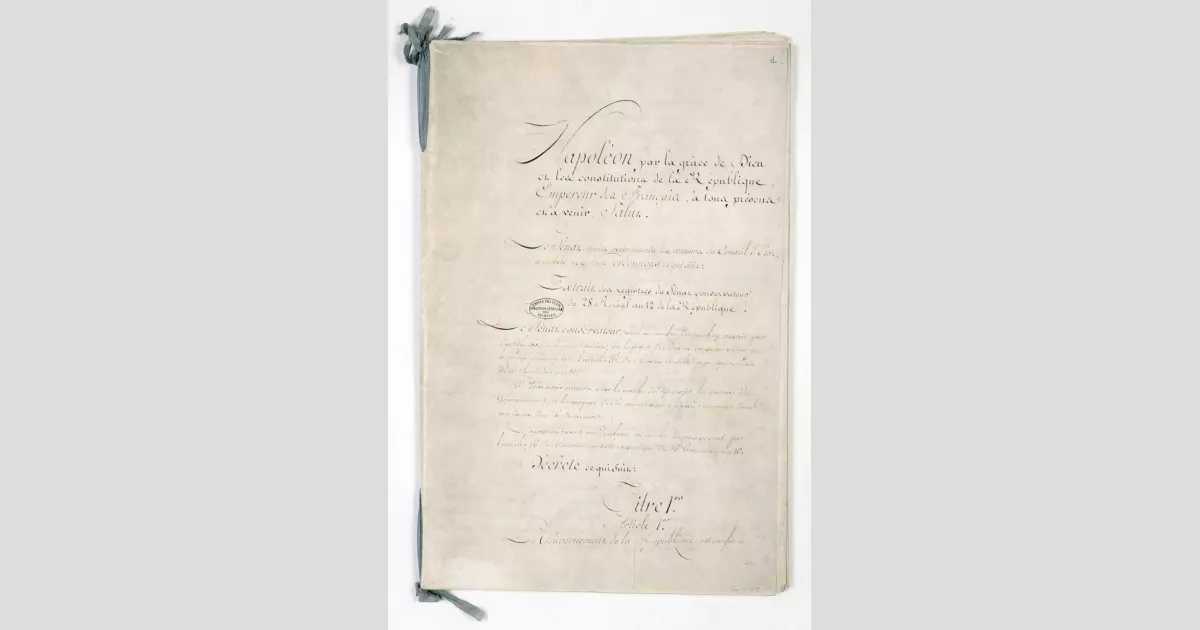A constitution serves as the foundational legal document for any organized entity, whether it be a country, company, or organization. It's a collection of fundamental principles and established precedents that define how the entity will be governed. The constitution essentially lays out the rules of the game, dictating the powers and responsibilities of different parts of the entity and the rights of its members.
1900: Sachsenspiegel Law in Germany
As late as 1900, the Sachsenspiegel, composed by Eike von Repgow between 1220 and 1230, was used as the supreme law in parts of Germany.
1931: Ethiopia's Modern-Style Constitution
In 1931, Emperor Haile Selassie I granted a modern-style Constitution to Ethiopia, replacing the Fetha Negest as the supreme law.
1938: Romania's Constitution
Romania's 1938 constitution, which installed a royal dictatorship, holds the record for the shortest overall process of drafting, adoption, and ratification of a national constitution, taking less than a month.
1946: Japan's Constitution Drafting
In 1946, during the drafting of Japan's Constitution, bureaucrats drafted everything in no more than a week.
1949: Swiss Federal Constitution Revision
In 1949, there was an official revision of the Swiss Federal Constitution.
1950: Basic Laws of Israel
Since 1950, the Basic Laws of Israel have been intended to be the basis for a constitution, but as of 2017 it had not been drafted.
1971: Swiss Federal Constitution Revision
In 1971, there was an official revision of the Swiss Federal Constitution.
1982: Canada Act and Constitution Act
In 1982, the Canada Act formally severed the British Parliament's ability to amend the Canadian constitution, and the Canadian constitution includes specific legislative acts as mentioned in section 52(2) of the Constitution Act, 1982.
1982: Swiss Federal Constitution Revision
In 1982, there was an official revision of the Swiss Federal Constitution.
1982: Patriation of the BNA Act
Over a century after its enactment, the British North America Act was patriated to the Canadian Parliament in 1982 and augmented with the Canadian Charter of Rights and Freedoms.
1986: Australia Act
The Constitution of Australia is supplemented with the Australia Act 1986, a statute of constitutional significance.
1988: Reconstruction of the Kouroukan Founga
In 1988, Siriman Kouyaté reconstructed the Kouroukan Founga, a 13th-century charter of the Mali Empire, from oral tradition.
1999: Swiss Federal Constitution Revision
In 1999, there was an official revision of the Swiss Federal Constitution.
2008: Myanmar Constitution Drafting
The Myanmar 2008 Constitution was secretly drafted for more than 17 years.
2009: Study on Constitution Drafting Time
In 2009, a study revealed that the average time for drafting a constitution is around 16 months, although there were extreme cases registered.
2011: U.K. Fixed-term Parliaments Act
In 2011, the U.K. Fixed-term Parliaments Act was legislated by a simple majority for strictly fixed-term parliaments.
2017: Status of Uncodified Constitutions
As of 2017, only two sovereign states, New Zealand and the United Kingdom, have wholly uncodified constitutions.
2050: Code of Ur-Nammu of Ur
Around 2050 BC, the Code of Ur-Nammu of Ur, the oldest known document of written laws, was created.
Mentioned in this timeline
New Zealand is an island country in the southwestern Pacific...
Myanmar also known as Burma is a Southeast Asian country...
Germany officially the Federal Republic of Germany is a nation...
Japan is an East Asian island country located in the...
Australia officially the Commonwealth of Australia encompasses the Australian mainland...
Canada is a North American country the second largest in...
Trending

11 minutes ago Elina Svitolina defeats Coco Gauff, faces Jessica Pegula in Dubai final.
11 minutes ago James Milner Breaks Premier League Appearance Record: Klopp Praises His Impact

1 hour ago Team Homan’s Olympic Curling Journey: Semifinal Setbacks and Future Games

2 hours ago Dorothea Wierer at Olympia 2026: Focus on Biathlon Massenstart and Preuß's Last Race.
2 hours ago Juventus vs Como: Preview, Predictions, and Spalletti's Demand for Serie A Reaction
2 hours ago Woman Charged After Abandoning Puppy; 'JetBlue' Finds Home with Saving Officer.
Popular

Jesse Jackson is an American civil rights activist politician and...
Randall Adam Fine is an American politician a Republican who...

Ken Paxton is an American politician and lawyer serving as...

Barack Obama the th U S President - was the...

Bernie Sanders is a prominent American politician currently serving as...
WWE Raw a professional wrestling television program by WWE airs...
